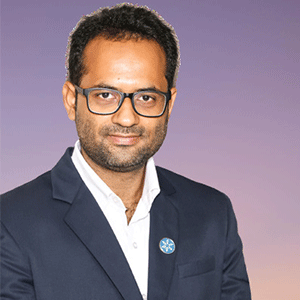
The global solar EPC Market is expected to cross $134 billion by 2030. Within India, the PM’s announcement during the COP 26 Climate Conference held in Glasgow, to make India emission-free by 2070, with an initial aim of decreasing emissions by 50 percent by 2030, is expected to act as a push to the EPC industry. Signif¬icant investments to the tune of Rs.4,500 crore ($616 million), with an additional allocation of Rs.19,500 crore ($2.5 billion) in Budget 2022 has the combined potential to produce at least 40 GW of solar modules. Since the solar revolution in India was in its early stages, Gensol Solar, founded in 2007, has been a participant in it and has equipped it with all the necessary tools to take advantage of the enormous opportunity.
Contribution of Gensol
The fact that Gensol has been a part of the solar revolution in India since the stage of its infancy has saddled it with all the capabilities required to capitalize upon the mammoth opportunity that stares us in our faces. It is worth noting that of India’s currently installed solar capacity of over 63,200 MW, Gensol has supported, through its spectrum of services. With 400+ projects totaling 33+ GWP domestically and 6+ GWP globally, Gensol has expanded to become India's largest Solar PV engineering company. Alongside managing solar projects with a combined capacity of over 4.7 GWp, Gensol also manages 13+ GWp of solar assets globally for clients in Oman, Gabon, the Phillippines, Indonesia, Africa, Afghani¬stan, and Sierra Leone.

Anmol Singh Jaggi, Chairman & MD
Offering top-notch EPC services over the years, Gensol has built projects totaling more than 550 MW. The largest single order of EPC projects that Gensol is currently installing is 180 MWp. Not only this, the fact that Gensol has been awarded technically complex projects like a 44 MWp floating solar project by a renowned PSU generator speaks about the customer-centric as well as the quality approach of the Gensol team. Gensol has bagged projects from large PSUs like NTPC, DVC and Singareni Coalfields, while the project sizes have grown from kW scale to large MW-scale. “Developing, designing, planning, constructing, and commissioning solar PV power projects is our karma, this is our passion and our daily business. We are a microcosm of young thinkers, engineers, and leaders committed to assisting the world in developing solar power projects that maximize investor profitability”, speaks Ali Imran Naqvi, CEO, Gensol Group.
Starting with the development phase, the firm looks at every aspect (be it financial, legal, compliance, administrative or other), and designs solutions based on its analysis for every client. Following this process with the planning phase, where all the action happens, Gensol’s team of experts start the project development process including all the architectural, technical, and engineering-related tasks, ensuring that the deliverables are of the highest quality. The Gensol skilled squad manages the end-to-end approval process by coordinating minutely with the local authorities, thus insulating customers from the hassles of this tedious procedure.
Since the solar EPC business is so price-sensitive, Gensol is always focusing its efforts on enhancing its service delivery through better engineering and cost-effective solutions. Given that there isn't much room to reduce the cost of modules and inverters, the balance of the system (BoS) including transformers, cables, junction bars electrical panels, monitoring, and protection devices, and others, is engineering-related. The company uses these BoS elements with great care and expertise in design to ensure that they can withstand the vagaries of time that the projects must deal with over the course of their 25-year lifespans.
“Our supply chain management team is always on its toes to ensure that the necessary components are delivered on time, allowing for optimal project scheduling and guaranteeing clocked and flawless generation”, adds Naqvi.
Also, throwing light on the fact that India’s national emissions are mostly driven by emissions from transportation (13 percent and 56 percent, respectively) and energy production makes a compelling case for supporting companies that made a quick transition to a low-carbon economy. In this process, Gensol has entered the EV manufacturing business, keeping in mind the tremendous possibility that this industry is ripe with. Production of electric vehicles will shortly begin at Gensol’s first plant in Chakan, Pune, and a second plant will be built in Sanand, Gujarat by the end of the present fiscal year. “We are a mid-sized EPC company with an insatiable hunger for growth and an unflagging desire to excel. Living with reasonable profits while building a portfolio teeming with increasing sizes is the hallmark of our success”, shares Naqvi.
Overcoming Challenges
While the industry presents a lot of opportunities, several hurdles also need to be addressed. Gensol as an established participant in the industry has not only witnessed the challenges evolve, but also combated multitudes of obstacles to emerge as a leading force. For instance, grid integration has its own challenges because it involves synchronizing renewable energy on an already-existing framework while also modernizing and expanding its capacity. Additionally, policy implementation delays often occur, in combination with financial issues which ultimately pose a serious threat to the growth of the industry.
The supply of solar modules is another major hurdle that can serve to slow down or even derail the progress of these ambitious goals. It is pertinent to note that the government has started to impose a 40 percent basic customs duty (BCD) on solar modules and a 25 percent BCD on solar cells from April, 2022. This decision is being hailed as a lifeline for the Indian solar manufacturing sector, which has lagged behind in producing not only downstream PV components like wafers and cells but also modules. It's further significant to note that India has 6.4 GW of capacity for PV cell production and 24 GW for module production. Module costs have increased due to BCD being in operation to the stage where it is enabling EPC contractors like Gensol to install a full rooftop solar project based on a metal shed using Chinese Tier-1 modules on a per-watt basis. "Super proud of the exceptional team at Gensol Group, we close new orders worth Rs.501 Crores to set up solar projects across India. With this, the unexecuted order book rises to Rs.1025 Crores", shares Anmol Singh Jaggi, Chairman & MD.

Puneet Singh Jaggi, Director
In addition to the issues which the industry is facing first-hand, there are also significantly attached expectations from clients which are being expertly addressed by Gensol. One of the biggest expectations comes in the aspect of pricing. Indian consumers are extremely price conscious. According to recent BCG data, India has the highest proportion across all categories. In addition, a post-COVID Kantar Media poll finds that 62 percent of consumers will hold off on making any high-value purchases until there is a sale or discount day. The field of solar energy and associated technology is handled in the same manner.
Gensol is small in size, has medium experience, and is beaming with large aspirations of being the best in the industry
“Gensol believes that the insatiable desire to stay afloat (by seeking meaningful profits) amid all turbulence has helped the company serve the valued customers with impeccable quality. Piquantly, the fact that we do not have high operational costs and neither we, typically, demand too high margins, has enabled Gensol to build projects that are stamped with extraordinary quality through reasonable margins”, further adds Naqvi.

Jabir Mahendi Aga, CFO
Future Roadmap
India now has 63 GW of solar installations or about 38 percent of the country's overall renewable energy portfolio. Plans for a new energy transition are based on India's advantage as the world's most cost-effective region for producing renewable energy, as well as forthcoming giga-factories by major corporate houses. By 2030, India will need at least 190 GW of solar installations or around $88 billion in investment over the following seven years. Keeping up with these expectations, in the upcoming years, Gensol aspires to secure as much of this expansion opportunity as it can. While the company’s solar business is prepared to generate Rs.1000 crore in FY 23–24, the company's EV manufacturing endeavour has the potential to generate Rs.6000 crore as yearly income over the following two years.
We use cookies to ensure you get the best experience on our website. Read more...